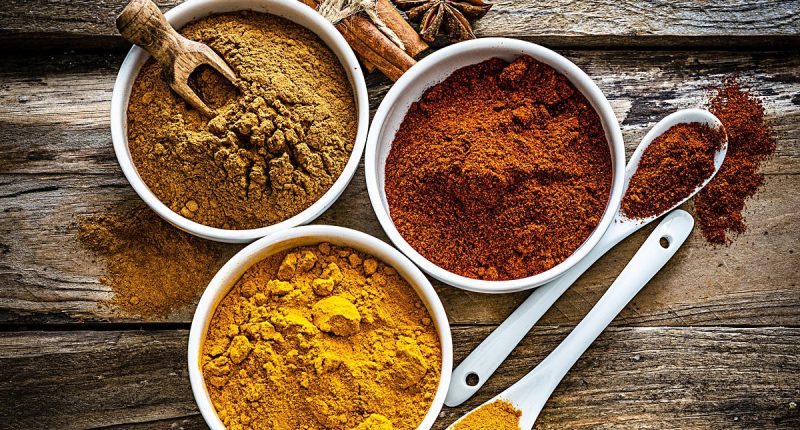Share this @internewscast.com
Three popular household spices used in everything from cakes to curries may make life-saving drugs useless, a medicines expert has warned.
Cinnamon, turmeric and ginger—said to naturally reduce inflammation and boost the immune system—can affect how the body metabolises a range of drugs, including those used to treat high blood pressure, diabetes, and common infections.
A recent study found that the main compound in cinnamon, cinnamaldehyde, which gives the spice its unique smell and taste, also activates receptors that trigger the body to process drugs much more rapidly, reducing their effectiveness.
While people who sprinkle cinnamon on their porridge should be safe, people who take cinnamon supplements could be at risk.
‘Overconsumption could lead to a rapid clearance of the prescription medicine from the body, and that could result in making the medicine less effective’, scientist Shabana Khan explained.
Studies have shown that for some medications, such as blood thinners, the rapid metabolism spurred by cinnamon can exacerbate the drug’s effect.
In the case of aspirin and warfarin, this means a risk of potentially deadly bleeding, according to Professor Dipa Kamdar, a pharmacist from Kingston University.

Cinnamon has previously been associated with reducing inflammation and boosting heart health, but some cheaper varieties could interfere with life-saving medications

People who take blood thinning medication should be caution when using cinnamon, experts advise
Experts now say the type of cinnamon matters too.
‘True’ cinnamon, a more expensive version of the spice originating from Sri Lanka, has been linked to a range of health benefits: it’s rich in antioxidants, anti-inflammatory, helps regulate blood sugar levels and has even been found to lower the risk of heart disease, according to Dr Kamdar.
Cinnamon bark, however, which is usually found in supermarkets, contains high levels of coumarin, which can cause liver damage in high doses.
Research also suggests that cinnamon could interact with other medications, like statins and antidepressants, making them more potent or less effective.
Another household staple with adverse side effects is turmeric, which has previously been linked with liver failure.
Turmeric has long been lauded for its anti-inflammatory properties, found in everything from immune boosting shots to curries.
‘There’s evidence that curcumin [the active ingredient in turmeric] can affect how some drugs are metabolised by interfering with liver enzymes [that process drugs],’ Prof Kamdar explained.
Curcumin is a compound that naturally occurs in turmeric, giving it its bright yellow colour.

Turmeric has also been lauded for its anti-inflammatory properties but experts say it has also been linked with liver failure

Experts warn that taking multiple supplements at one time carries potential dangers due to unknown interactions that can make prescription drugs more potent or less effective
Prof Kamdar continued: ‘This means it could potentially interact with antidepressants, blood pressure medications, chemotherapy drugs and certain antibiotics.’
In extreme cases, high doses of curcumin taken with black pepper—which helps the body absorb the spice—have been linked to severe liver damage.
In a study published in The American Journal of Medicine, researchers looked at the turmeric-associated liver injury cases recorded in the US between 2004 and 2022.
They discovered 10 cases of liver damage caused by the spice. Five people were hospitalised and one person died of acute liver failure.
The 62-year-old woman had no history of liver disease and was taking turmeric root extract for her arthritis. She was also taking tramadol—a strong painkiller—a nasal decongestant for her allergies, and other multivitamins including ginger and vitamin D.
She developed fatigue and nausea followed by jaundice, after taking turmeric once daily for 14 months. She stopped taking the supplement, but her symptoms did not improve and she was listed for a liver transplant.
She died within five weeks of the onset of symptoms.
Doctors concluded that the liver failure was probably caused by turmeric, which could have interacted with the other medications she was taking.
The NHS warns taking herbal supplements could make other medicines trigger unexpected side effects.
Prof Kamdar also speculated that, because turmeric has been found to lower blood sugar levels in animals, it could have the same effect in humans.
‘This means it could increase the effects of anti-diabetic drugs or insulin.
‘Additionally, turmeric has been shown to reduce blood pressure, which when combined with blood pressure medications could cause an excessive drop’, the pharmacist explained.
However, she stressed: ‘As with cinnamon, these effects are most often linked to high dose supplements, not the small amounts used in food.’
Ginger is another common spice lauded for its anti-nausea and anti-inflammatory effects. But, Prof Kamdar warns, its active compounds could interfere with the body’s ability to process medication.
Some studies suggest high doses of ginger may lower blood sugar, potentially increasing the impact of diabetes medication, risking deadly hypoglycemia.
Ginger can also act as a mild blood thinner, Dr Kamdar added.
She said: ‘If you’re taking medications, especially blood thinners, diabetes medicines, or chemotherapy drugs, it’s worth having a quick chat with your doctors or pharmacist before starting any new herbal supplements.’
‘But for most people, using spices in typical culinary amounts is safe. So go ahead: sprinkle, pinch, or dash—just be mindful of what’s in your medicine cabinet—and be wary of taking any herbal supplement in high doses.’
According to the NHS, around 350,000 people are prescribed blood thinners every year, putting millions of people who take this medication alongside herbal supplements at risk of potentially deadly bleeding.
The number of people taking anticoagulants is set to rise, following a major NHS drive to rapidly expand their use to help prevent stroke fatalities.
However, Dr Kamdar warns, that taking these spices in high doses at a regular basis alongside these prescription drugs could have potentially life-threatening side effects.













